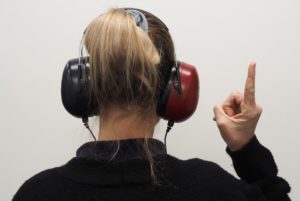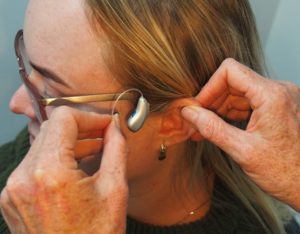
If you have a question about hearing aids, it was likely answered in the Eye & Ear Foundation’s February 9 webinar. Catherine Palmer, PhD, CCC-A, Professor in the Department of Communication Science & Disorders and Professor in the Department of Otolaryngology at the University of Pittsburgh, and Director of Audiology for the UPMC Integrated Health System, gave a comprehensive presentation titled, “Hearing Aids: Everything You Need to Know.”
The Best Hearing Aid?
Throughout the webinar, Dr. Palmer addressed the most common questions she receives about hearing aids. People always ask, “What is the best hearing aid?” and “My friend loves his hearing aids; should I get the same ones?”
These questions are very device focused, Dr. Palmer said. “Audiologists customize solutions,” she added. “There is no one best solution. There is a best solution for the individual patient.”
It is important to separate the device and its technology from the service and care that go into selecting the correct device and setting it up for that individual. Most people do not think about both pieces, Dr. Palmer said. A lot of people think there must be a best hearing aid made by a company, while the reality is there are six major companies that produce excellent technology. Some may be a little better in certain niche areas than others. Audiologists understand the different manufacturers and products and can match the right technology with the person.
The Importance of Fitting
To do this, audiologists will take an hour or so to assess your hearing. They will ask extensive interview questions to get a sense of your lifestyle, communication issues, and needs. Part of the assessment is figuring out where the problem is coming from in case it is a medical issue that should be treated by a physician.
About 95 percent of hearing loss in adults is not medically treatable, like noise-induced hearing loss or age-related hearing loss. The solution? Well fit hearing aids.
One of the most important parts about a hearing aid fitting and one that is often ignored is customizing the physical fit. Customizing the acoustics that end up in the ear is part of the process. A hearing test helps determine how much hearing loss there is and where the problems are coming from. To fit a hearing aid correctly for an individual, a microphone is placed in the ear canal and measures the output of the hearing aid. This accounts for the size of the individual’s ear canal which impact how much sound is delivered to the eardrum. This is especially important for pediatric patients, because their tiny ear canals build up a lot of extra sound, which can damage their hearing if this isn’t accounted for in the hearing aid fitting.
All this information is mapped on a graph that compares the hearing aid output to the individual’s hearing thresholds across frequency (pitch), to aid in customizing the acoustic fit.
It is important to note that there is a two-to-three-week adaptation period to get used to well-fit hearing aids. Wearing them full time, the whole time you are awake (except when swimming or bathing), will help retrain your brain.
Hearing Loss is a Big Deal
There are lots of data to support this. Untreated hearing loss is associated with:
- Increased cognitive decline
- Increased risk of falling
- Increased depression
- Increased odds of social isolation
- Decreased social participation
- Increased risk of not following the doctor’s treatment recommendations
- Increased medical adverse events
- Increased hospitalization and readmission
Clearly, these are all negative repercussions of not treating hearing loss. When hearing loss is treated, however, every one of these things improves.
In 2020, the Lancet Commission found that 40 percent of the risk of dementia is potentially modifiable. Of the 12 risk factors, hearing impairment is the single largest modifiable risk factor. In other words, if hearing loss is treated, cognitive decline could be delayed or less severe.
Why are Hearing Aids So Expensive?
Typically, the price is bundled. In addition to the device itself, you are paying for the service, expertise that goes into figuring out what you need, fitting, and follow up care. There is usually a two-year warranty for any kind of repair, damage, or loss. The devices themselves are like tiny computers, and the research and development that goes into them is part of what drives the costs.
How Long Should I Expect a Hearing Aid to Last?
Manufacturers estimate the lifespan of a hearing aid is about five years. In some cases, it can be repaired and used beyond that. They are also useful to keep as backup devices when new devices are purchased.
“We don’t recommend people get new hearing aids just for the sake of getting new ones,” Dr. Palmer cautioned. An audiologist will help determine if it is time.
Does it Matter Where I Go to Get My Hearing Aids?
An audiologist has four years of education after receiving their undergraduate degree. They receive a clinical doctorate in audiology. They do not just learn about hearing aids, but about diagnosing hearing problems and understanding treatment avenues.

By going to an audiologist, you are getting the following:
- Education
- Expertise
- Access to all the technology
- Relationship you will have for the rest of your life (product and service)
- Hearing health care vs retail experience
Retail outlets tend to be specific to one manufacturer. Once you need hearing aids, you do not stop needing them, so go where you are comfortable. If a hearing aid is a retail purchase, it is very device focused. Dr. Palmer encourages the view that you are pursuing hearing healthcare, not a device. She has seen people come in wearing very good expensive devices that have not been fit correctly. “It is better to start out on the right foot,” she said.
Should I Wait Until Medicare Covers Hearing Aids to Get Them?
The short answer is no. As part of Build Back Better, there is a Budget Reconciliation Bill in the works that may include some level of coverage for devices for individuals with moderately-severe to profound hearing loss. There is no guarantee it will make the final language or pass the Senate. Currently, hearing tests are covered, but not hearing aids. Medicare needs to cover services related to hearing aid fitting as well as the devices.
I Need Help with the Devices I Already Own. Can I Come in and Get Help Without Buying New Devices?
Yes, but:
- Does the practice welcome this type of work?
- Are the devices you have “locked?”
- No matter what, we can measure how they are working and provide advice based on those results
If you purchased your hearing aid elsewhere, a UPMC audiologist will be able to tell you if it is locked. This means you can only go to the place of purchase for changes. However, the UPMC audiologist also can make measurements and give advice.
I’m Thinking About Getting Over the Counter Hearing Aids. How Will I Know Which to Get?
The FDA has put out proposed rules related to Over the Counter (OTC) hearing aids. The final rules will be released later this year. OTC hearing aids do not actually exist now. If you are seeing ads, they may be for personal sound amplification products, which are different than OTC hearing aids. Some hearing aids are being sold direct to consumers because this is legal in some states, but true OTC hearing aids will not come out until the FDA finalizes the proposed rules.
So how do you know what to get? Currently no one can know this because they do not exist. Dr. Palmer thinks it is worth your time to go to audiology for a hearing test. This is covered by insurance, both Medicare and commercial payers. “With this, we can tell you if you are a good match for OTC hearing aids and advise which to get,” Dr. Palmer said.
Note OTC hearing aids are targeting mild-moderate hearing loss and do not expect you to be a full-time user.
With My New Glasses, I Could See Perfectly Right Away. Why Don’t My New Hearing Aids Work Like That?
Dr. Palmer gets this question at least once a week. The typical vision problem is conductive, which means the visual signal is not getting to the sensory system of vision. Glasses correct that unless you have macular degeneration. If the hearing loss is medically treatable, once treated, it will be fine as the signal will now be going into a good sensory system. However, the other kinds of hearing loss – like noise induced or age-related hearing loss – created damage to the sensory system. Even when the hearing aid is fit perfectly, it is delivering correct sound but going through a damaged sensory system. The damaged sensory system adds distortion to the signal, which is not perfect when it gets to the brain.
There are ads that make it seem like hearing aids are magical and can solve this clarity issue, but that is not true, Dr. Palmer said. The clarity issue is coming from the sensory system.
In addition to well-fit hearing aids, you must have a realistic expectation that they will not fix your hearing. They will make your hearing better, but it will not be perfect. Your family has to understand this, too.
Costco Has Second Rate Hearing Aids, Right?
Costco has the exact same hearing aids that all hearing health care providers access, but they are labeled differently. Some of their devices are “locked,” so you cannot get assistance anywhere else but Costco. The devices are significantly lower in cost because Costco buys in bulk, like all their other products.
If Costco Has the Same Technology, Why Shouldn’t I Go There and Save Money?
Costco has an excellent program of promoting from within, but that means the person fitting hearing aids most likely was working somewhere else in the store previously. This person will be trained in hearing aid fitting but will not be an audiologist. Getting aids at Costco means physical fit may not be customized. Some of the hearing aids are locked, so you will not be able to receive care elsewhere. After a two-year warranty, hearing aids are not sent in for repair. Instead, Costco typically recommends you purchase new devices. This is potentially a more costly endeavor over time.
I Still Do Not Hear as Well as I Would Like with My Hearing Aids in Noise. Should I Buy New Ones?
Do not buy new ones! There are things to check:
- Are they fit correctly in terms of returning audibility (this requires real ear probe microphone verification)?
- Are you using two hearing aids?
- Are you using them full time?
- If all of this is true, you may need to improve the signal-to-noise ratio to improve communication by using a remote microphone to put near the sound source or by using captioning to supplement your communication.
I Hear That if I Get an OTC Aid, I Will Be Able to Adjust It Myself; I Will Not Need an Audiologist, Right?
Recent research has shown that the majority of people getting “direct to consumer” devices needed assistance with the fitting, Dr. Palmer said.

My Spouse Says I Have Hearing Loss, But I Would Know if I Had Any, Right?
Hearing loss is under-recognized, said Dr. Palmer. Forty percent of people who have it recognize it. Fifty percent of health providers recognize hearing loss.
Will I Have to Stop Using My Air Pods to Hear My Cell Phone, Music, and Podcasts Once I Have Hearing Aids?
Hearing aid technology has advanced; now many hearing aids have Bluetooth connectivity with smart phones.
How Will I Manage Tiny Hearing Aid Batteries When My Hands Shake?
Ideally, this would come up in your hearing assessment because then your audiologist can direct you to hearing aids that uses rechargeable batteries.
Questions to Ask When Looking for Hearing Health Care
- Am I seeing an audiologist?
- Is the group compensated through commission?
- Are you able to order technology from the six hearing aid manufacturers?
- What is the warranty for devices?
- Do you use real ear probe microphone measurements to verify the audibility of the fitting?
- What is the return period to allow me to adjust to the new amplification and be sure it is helping in the environments that are important to me?
UPMC’s policy is to offer a minimum of 45 days to make sure the hearing aids are making a difference in the listening situations that are important to you.
Q&A
There are hearing aid solutions for hearing loss in one ear, like a CROS hearing aid, an implantable bone anchored device, or a cochlear implant. You will want to meet with the audiologist to understand these different options.
Patients with a lot of ear wax have options as well. An audiologist will work to help you find the best way to self-manage wax, so it does not damage the hearing aid. Getting your ears cleaned regularly will also help.
Devices that point in the direction of sound are remote microphones. Ads make it look like you can just hold it when it has to be close to what you want to hear. This is optimal for a 1:1 situation, not in a group.
Data suggests that for the majority of people with tinnitus, hearing aids reduce the perception.
Dr. Palmer recommends getting a baseline hearing test at age 55. If no hearing loss is found, come back in 3-5 years unless you notice something sooner.
There is no right or wrong answer about whether to get a behind the ear aid or one that is inside the canal. It depends on the hearing loss, lifestyle, size of the canal, and preference. An audiologist will talk about the pros and cons with you. If you want the aid to be invisible, be honest with the audiologist because that will take you down a certain path.
The best way to contact the clinic for services is to call the Oakland location at 412-647-2030. There are satellite offices, so it is not necessary to come to Oakland. It is all one group that does things the same way. “I’m happy to see you, but we have a fantastic group of audiologists,” Dr. Palmer said.